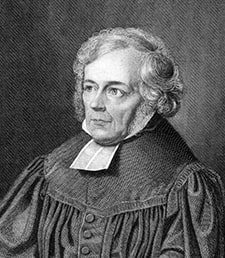Friedrich Daniel Ernst Schleiermacher (1768 – 1834) was a German theologian who is generally recognized as the founder of modern Protestant theology. He wrote about theology, preaching, classical philology, and his major work, Der christliche Glaube (1821–22; 2nd ed. 1831; The Christian Faith), is a systematic interpretation of Christian ideologies.
Schleiermacher attended a school called the Moravian Brethren. This group is very influential and they teach a lot about Pietism. In this environment, students were encouraged to focus on their own individual studies, while also being focused on their relationship with God through joy and imagination. Schleiermacher was interested in the Greek and Latin classics and their connection to religion. He developed this interest over his lifetime and developed a unique perspective on religious life.
He changed his name to Herrnhuter in 1785, after attending a seminary in Barby, Germany. At the seminary, he became dissatisfied with its narrow, dogmatic approach. He left in 1787 with the reluctant permission of his father – a chaplain.
Schleiermacher began his theological studies and an intensive study of the philosophy of Immanuel Kant. He remained a Kantian throughout his life. Two years after he moved to a new place, he started studying for his first theological exams. Although he read more in ethics than theology, he passed his exams in theology in 1790 with marks of “very good” or “excellent” in all fields except dogmatics, the one area in which he was to make his real contribution.
After taking his second theological exams in 1794, Schleiermacher became an assistant pastor in Landsberg and then, in 1796, Pastor of the Charité, a hospital and home for the elderly just outside Berlin. The man found his way into the circle of German Romantic writers through the creator of early Romanticism, Friedrich von Schlegel. In his work “On Religion: Speeches to Its Cultured Despisers”, written in 1799 as a kind of literary confession, Schleiermacher addressed the Romantics with the message that they were not as far from religion as they thought, for religion is the “feeling and intuition of the universe” or “the sense of the Infinite in the finite” and Christianity is one individual shaping of that feeling. This work, perennially attractive for its view of a living union of religion and culture, greatly impressed the young theologians of the time.
His other work, The Monologen (1800) was written in a somewhat artificial rhythmic prose, presented a parallel to religion in the view of ethics as the intuition and action of the self in its individuality.
In 1804, he was called to be a preacher at a university. He became a member of the faculty of theology at the University of Halle. During this time, he published a brief overview of theology, and he was also active in promoting the Prussian Union, which united Lutheran and Calvinist churches. During this time, his major publications were the “Brief Outline of the Study of Theology” and “Der christliche Glaube.”
Schleiermacher preached his last sermon on February 2 and gave his last lecture on February 6, 1834. A few days after he died, his lungs became inflamed. It caused a lot of commotion in the whole city, and a well-known historian estimates that there were between 20,000 and 30,000 people who followed his funeral procession through the streets of Berlin.


